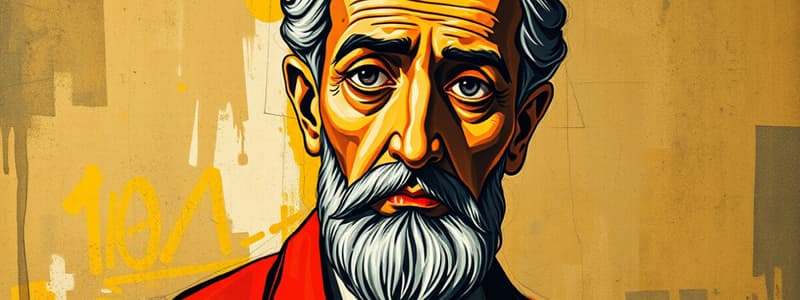Podcast
Questions and Answers
Who is known as the founder of classical criminology?
Who is known as the founder of classical criminology?
- Robert Agnew
- Cesare Lombroso
- Jeremy Bentham
- Beccaria (correct)
What is the basic premise of the classical theory of criminology?
What is the basic premise of the classical theory of criminology?
Criminal behavior is a matter of free will and choice.
Who is credited with the formation of the neoclassical school of criminology?
Who is credited with the formation of the neoclassical school of criminology?
- Edwin Sutherland
- Cesare Lombroso
- Jeremy Bentham (correct)
- Beccaria
Bentham believed Beccaria was too strict.
Bentham believed Beccaria was too strict.
What is crime according to the classical perspective?
What is crime according to the classical perspective?
Define criminology.
Define criminology.
What major theory explains the connection between religion and government in early criminological thought?
What major theory explains the connection between religion and government in early criminological thought?
What was the age of classical criminology characterized by?
What was the age of classical criminology characterized by?
Beccaria believed punishment should be ____, ____, and ____.
Beccaria believed punishment should be ____, ____, and ____.
Harsh punishment is an effective deterrent according to Beccaria.
Harsh punishment is an effective deterrent according to Beccaria.
Who is considered the father of criminology?
Who is considered the father of criminology?
What is psychological positivism?
What is psychological positivism?
According to Freudian theory, crime is a symptom of a person's unresolved psychological ____.
According to Freudian theory, crime is a symptom of a person's unresolved psychological ____.
Match the following modes of personality adaptation with their descriptions:
Match the following modes of personality adaptation with their descriptions:
What is the general strain theory proposed by Robert Agnew?
What is the general strain theory proposed by Robert Agnew?
Crime is learned according to criminological theories.
Crime is learned according to criminological theories.
What does social bond theory state?
What does social bond theory state?
What does feminist criminology study?
What does feminist criminology study?
Define index crimes.
Define index crimes.
What is an example of a random crime?
What is an example of a random crime?
Flashcards are hidden until you start studying
Study Notes
Beccaria and Classical Criminology
- Beccaria is regarded as the founder of classical criminology, marking a significant shift in criminological thought.
- His views laid the groundwork for the 6th and 8th Amendments concerning fair trial and punishment.
Classical Theory of Criminology
- Criminal behavior arises from free will and choice.
- The theory posits that certain, swift, and appropriate punishment can deter criminal activities.
Jeremy Bentham and Neoclassical Criminology
- Bentham's contributions led to the development of the neoclassical school, focusing on free will in criminal behavior.
- He believed that pain and punishment could effectively deter crime.
Distinction Between Beccaria and Bentham
- Bentham perceived Beccaria's ideas as overly strict in their approach to punishment.
Understanding Crime
- Defined as a choice based on an individual's assessment of potential pleasure versus pain.
The Discipline of Criminology
- Interdisciplinary field that studies crime and its ramifications on society and the criminal justice system.
Historical Theories on Crime
- Early concepts linked religion closely to government, where evil was believed to be expelled through divine intervention.
Ideals of Classical Criminology
- Emerged during the Age of Enlightenment, emphasizing reason and individual rights.
Beccaria's Punishment Philosophy
- Advocated for minimal punishment that is proportional to the crime committed, challenging harsh deterrents.
Age of Enlightenment Context
- Informed by Bentham's belief in free will directed toward pleasure, leading to his innovative prison design.
Cesare Lombroso's Contribution
- Comprised the foundation of criminology, emphasizing biology, with the belief that criminals could be physically identified.
Psychological Positivism
- Suggests behavior is influenced by subconscious desires, indicating that criminal actions result from unresolved psychological conflicts.
Freudian Theory Implications
- Views crime as a manifestation of unresolved psychological issues, such as unfulfilled desires or personality conflicts.
Signals of Troubled Behavior
- Identifying early signs of potential criminal behavior can include indicators like animal abuse.
Social Disorganization Theory
- Introduces the concentric zone theory, asserting that crime is concentrated in urban centers before radiating outward.
Strain Theory Explanation
- Positions crime as stemming from frustration within lower-class individuals due to socio-economic obstacles, leading to illegal activities.
Merton's Modes of Personality Adaptation
- Differentiates five styles: conformist, innovator, ritualist, retreatist, and rebel, based on how individuals adapt to societal pressures.
Detailed Modes of Adaptation
- Conformist: Adheres to laws despite not achieving success.
- Innovator: Circumvents systems through fraud or illegal methods.
- Ritualist: Engages in habitual actions without seeking change or success.
- Retreatist: Withdraws from society, often through substance abuse.
- Rebel: Seeks to redefine societal norms, often through radical means.
Contributions of Robert Agnew
- Developed the general strain theory, highlighting the roles of positive and negative stimuli in inducing crime.
Crime as a Learned Behavior
- Criminal behavior is learned through interactions and socialization rather than inherent predisposition.
Social Bond Theory Insights
- Crime occurs when societal bonds are weakened or severed, emphasizing the importance of community ties.
Feminist Criminology Focus
- Examines crime and criminality through the lens of gender-based power dynamics and inequalities.
Index Crimes Definition
- Major felonies classified as index crimes, which carry potential punishments exceeding one year in prison.
Nature of Random Crime
- Notably characterized by unpredictable and often opportunistic acts of criminal behavior.
Studying That Suits You
Use AI to generate personalized quizzes and flashcards to suit your learning preferences.




